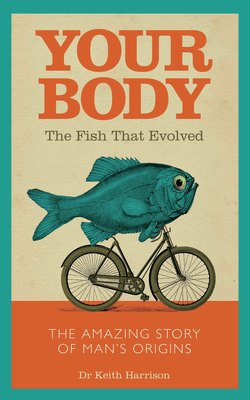Читать книгу Your Body - The Fish That Evolved - Dr. Keith Harrison - Страница 17
На сайте Литреса книга снята с продажи.
Evolution never sleeps
ОглавлениеEvolution never stops, but nor is it ever heading towards a goal; it is simply a passive response to natural selection, which in turn never stops. Humans are not, as was once thought, the pinnacle of evolution; evolution has no pinnacle, it goes on for ever. We are not even today’s most advanced species. Every species alive has been evolving for the same length of time – since life first appeared on the planet – and all deserve equal consideration as successful survivors.
There is a tendency to look at body shapes that have existed in the fossil record virtually unchanged for tens of millions of years – for example, ferns, sharks and crocodiles – and see them as primitive forms frozen in time. However, evolution does not just affect the outside of an animal or plant, it also affects the inside, both the organs and how they function. Even the chemistry of all living things is subject to change. Just because a species looks similar on the outside to a related species that lived millions of years ago does not mean that that group has not evolved for millions of years. Any gardener will tell you ferns suffer from very few diseases and are attacked by very few pests, and very few animals eat them. Their chemical defences are extremely efficient. That does not mean the ancient ferns had similar advantages. Ferns may have spent millions of years evolving these defences while their outer form changed very little. Sharks also suffer from few diseases and crocodiles have such an effective healing capability – recovering from severe wounds in very polluted waters with little infection – that medical researchers are now trying to identify the factors in crocodiles’ blood that defend them against bacteria in the hope of discovering a new drug similar to penicillin.
Nor are species alive today somehow better than species in the past. Each is or was tailor-made for its own environment. Past species were not intermediates on the way to something else. To put this in a context, we can look back to people who lived 10,000 years ago and see they had less knowledge, less technology, less medicine and less comfort than we have today, but, before we describe them as primitive or backward, we should consider what the world will be like for people 10,000 years in the future. They will have lives and facilities incomprehensible to us. Do we want them to look back at us and see us as primitive or backward intermediates whose only purpose was as stepping-stones on a path leading to them? I don’t think so. We do not exist to prepare the way for future generations. We react to, and survive as best we can in, the world of the present. Evolution does the same. Every species is right for its time. Its time may be short or it may be long, but the very fact that it existed at all indicates that at that moment it was a survivor. We should remember it took life 3,500 million years to produce the dodo. This bird was honed by natural selection to fit the environment of Mauritius. It was only when Europeans arrived and changed that environment by introducing European species that the dodo found itself ill equipped, just as we would be if someone released a pride of lions in our local shopping centre (dodos nested on the ground and were probably too vulnerable to the egg-raiding pigs introduced by the sailors).
Without human interference, the dodo was a survivor, but survivors are not always easy to spot. No species that lived on the planet 400 million years ago still lives on it today, yet if they were all extinct there would be no life today. There are two ways for species to disappear: their representatives may dwindle in number until the last one finally expires – the classic extinction – or the species may evolve into one or more other species, unrecognisable as the same animal or plant as its ancestors. About 4 million years ago, just such a species swung down out of the trees and strode out onto the grasslands of Africa. That species no longer lives – if we passed it in the street it would be instantly recognisable as different to anything we know – but nor is that species extinct. Like so many before, it has survived by shape-shifting down the ages and into today’s world. Now it is time to consider its descendants.
